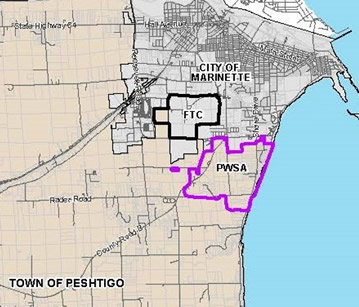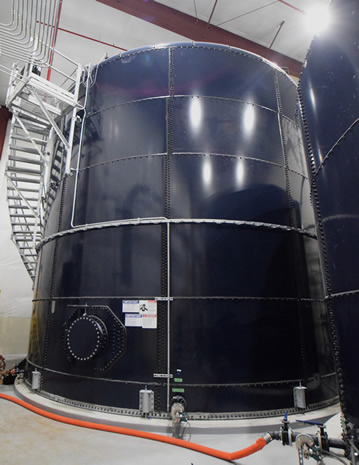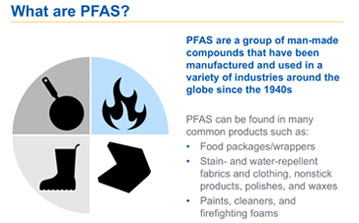PFAS Groundwater Project Information
Learn more about the history of the project, our plans and our actions.
Our Goal
Our priority is to ensure the community’s water is safe and that residents are protected from PFAS contamination from our historic operations. We have worked proactively, quickly, and collaboratively to identify and resolve the issues facing this community. We’ve hired a world-class team and are using cutting-edge technologies to investigate and remediate the situation.
History
When testing revealed the presence of PFAS near the boundary of Tyco’s Fire Technology Center (FTC) in Marinette in late 2016, we notified the Wisconsin Department of Natural Resources (DNR) and began a site investigation in 2017. We conducted testing in private drinking water wells in the Town of Peshtigo and found that some wells contained PFAS, some at levels higher than the recommended drinking water standard that was in place at that time of 70 parts per trillion (ppt).
As soon as we became aware that PFAS from historic operations at the FTC migrated into private drinking water wells in Peshtigo, we took responsibility, provided bottled water and point-of-entry treatment systems (POETS), and moved rapidly to address this issue and identify long-term solutions.
Remediation Underway
We have extensive efforts underway to address PFAS from the FTC, where Tyco historically tested Aqueous Film-Forming Foams (AFFFs) and trained firefighters how to use them at our Fire Training Center. (More about AFFF under Background below.)
After years of thorough investigation and more than 40 reports submitted to the WDNR, we know that PFAS from our historic operations affected soil on our property, some private drinking water wells in the Town of Peshtigo (specifically 169 wells in an area known as the Potable Water Sampling Area or PWSA), and groundwater under our property and extending to the east and north.
We’ve made a lot of progress in going after this PFAS and fixing the situation. From a $25 million state-of-the-art facility to scrub PFAS out of groundwater, to excavation and removal of affected soils to an out-of-state licensed disposal facility, to working with neighbors to deliver long-term clean drinking water through new deep wells, we are actively solving the problem. Our efforts are thorough and comprehensive, and we believe represent the kind of responsible approach that we hope the many other contributors to PFAS in the environment will also step up and take.
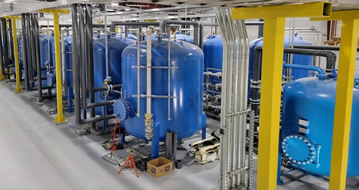 Groundwater
Groundwater
In May 2021, WDNR approved our plan for a Groundwater Extraction & Treatment System (GETS) designed to focus on the area where the vast majority of PFAS is migrating from historic operations at Tyco’s Fire Technology Center (FTC). The GETS extracts groundwater containing PFAS before it upwells into Ditch B, transports the groundwater via underground pipes to a treatment system that removes PFAS from the groundwater, and delivers the treated water, significantly below DNR standards, into Ditch B. The GETS is now operating and successfully treating the groundwater for PFAS before it is discharged into Ditch B. (See GETS fact sheet)
Soil
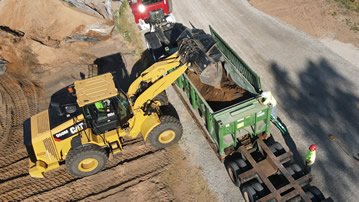 In June 2021, Tyco began excavating and removing soil with PFAS from the FTC. All of the stored soil from the construction of the Advanced Research & Testing Facility, and the soil with aggregated PFAS from 5 locations in the FTC’s Outdoor Testing Area has been loaded into rail containers and transported out of state for disposal at a permitted facility. (See Soil fact sheet)
In June 2021, Tyco began excavating and removing soil with PFAS from the FTC. All of the stored soil from the construction of the Advanced Research & Testing Facility, and the soil with aggregated PFAS from 5 locations in the FTC’s Outdoor Testing Area has been loaded into rail containers and transported out of state for disposal at a permitted facility. (See Soil fact sheet)
Long-Term Drinking Water
In 2022, Tyco contacted the owners of impacted wells in the PWSA to understand their preferences about long-term water solutions and take direction from those neighbors about delivering those solutions to them. After extensive analysis by independent experts hired by Tyco or by the Town of Peshtigo, and paid for by Tyco, four possible clean water options were identified. Tyco reached over 90% of the 169 well owners. Most favored deep wells, a significant percentage were open to annexation that would be needed to get water from the City of Marinette, and very few supported the possibility of securing water from the City of Peshtigo.
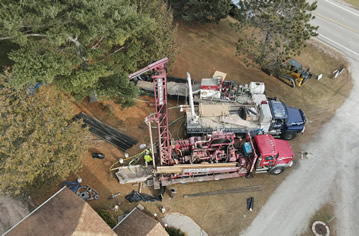 Efforts were made by some neighbors to go through the legally mandated process to pursue annexation to the City of Marinette and secure water. The effort failed to secure the needed demonstration of support (51% of electors and 50% of property value/acreage). Tyco then made clear to those neighbors that they can still choose deep wells, and many have done just that. (See Deep Well fact sheet and our Deep Well FAQ)
Efforts were made by some neighbors to go through the legally mandated process to pursue annexation to the City of Marinette and secure water. The effort failed to secure the needed demonstration of support (51% of electors and 50% of property value/acreage). Tyco then made clear to those neighbors that they can still choose deep wells, and many have done just that. (See Deep Well fact sheet and our Deep Well FAQ)
Tyco has sent deep well agreements to all the property owners in the PWSA. To date, 150 property owners have made clear their desire for a deep well and sent back signed agreements. More than a 95% of these properties have had new deep wells installed. As part of the installation process, Tyco also connected treatment systems (water softener plus reverse osmosis system) that successfully treat naturally occurring elements (including radium) to meet applicable standards. All test results from the 250+ samples collected by Tyco demonstrate the deep well water is safe to drink.
Investigation
These remediation plans are based on over 5 years of investigating soil, groundwater, surface water and air to find out how PFAS moved from the FTC and where it went. This included the submittal of over 40 reports with thousands of supporting data, figures, and appendices. We also implemented interim solutions as quickly as possible, including providing bottled water or in-home treatment systems to residents whose drinking water was impacted, and addressing PFAS from the FTC in drinking and surface water while we identified the long-term solutions detailed above. In April 2023, we submitted our updated site investigation findings including final groundwater investigation results that clearly define the boundaries of the area impacted by PFAS from Tyco’s historic operations.
Since 2017 and in dozens of reports submitted to WDNR, we identified the site investigation area based on extensive research and analysis to understand how PFAS traveled from the FTC and where it went.
- We examined PFAS in groundwater, soil, and surface water.
- We analyzed how PFAS from historic operations moves in the environment.
- We evaluated the geology of the area – sand aquifer, bedrock etc.
- We analyzed whether PFAS from the FTC could have moved off our site through the air.
- We installed hundreds of investigation points [Vertical Aquifer Profiling (VAPs), piezometers, soil borings and monitoring wells] to more fully delineate surface water and groundwater characteristics and flow patterns.
- We’ve compared the types of PFAS (fingerprint) present at the FTC and in the related groundwater plume with the fingerprint of PFAS in drinking water wells in the ESIA and found that they are distinctly different from each other.
Now, under oversight by the WDNR, Tyco operates a comprehensive groundwater monitoring program encompassing more than 200 wells across approximately 4 square miles. This program builds on eight years of detailed plume characterization, providing a strong foundation for consistent assurance of water quality. Monitoring results continue to confirm clear progress, with PFAS concentrations trending downward across the plume. In the shallow groundwater, concentrations have decreased by up to 27%, while the highest core concentrations have been reduced by as much as 42%. These reductions reflect meaningful and sustained improvement.
Initial Actions Taken
Our priority was to ensure the community’s water is safe and that residents are protected from PFAS contamination. To do so, we immediately offered bottled water and point-of-entry treatment systems (POETS) to all households in the Town of Peshtigo potentially impacted by PFAS from historic FTC operation (known as the Potable Well Sampling Area or PWSA).
We also took immediate steps to stop PFAS from traveling from the FTC, including:
- Stopped outdoor testing of firefighting foam (AFFF) in 2017
- Ceased untreated industrial wastewater discharges to the City of Marinette’s treatment plant in 2019
- Supported the City of Marinette in managing its biosolids by providing $4.3 million to pay for advanced equipment and licensed disposal of biosolids instead of land spreading that ended in 2018.
- Installed interim filtration systems at Ditches A and B in 2019 to reduce PFAS in surface water.
- Constructed and operating an on-site wastewater treatment system in the $11 million Advanced Research & Testing Facility under City of Marinette permit since 2022. Treated industrial water is discharged into relined wastewater lines leading from our properties to the Marinette wastewater treatment plant.
Actions in BioSolids Area
Even though this is a complicated issue and there are multiple potential sources of biosolids, Tyco has taken affirmative action with respect to biosolids by providing bottled water on request to homeowners in the WDNR designated “biosolids area,” northwest of the FTC. Tyco funded a dryer for the City of Marinette and paid to transport its biosolids to a licensed landfill since 2018, therefore, the City of Marinette has not land spread any biosolids for the last 5 years. Tyco also stopped all industrial wastewater discharges from the FTC to the City of Marinette wastewater treatment plant in 2019. Tyco then invested millions in building an on-site, state-of-the-art water treatment system at the FTC that treats all industrial water before it is discharged to the City of Marinette, under a permit. Tyco has acted to make sure the environment is protected while no one else has, including the DNR.
WDNR’s actions with respect to biosolids have been concerning. The WDNR has allowed and continues to allow millions of gallons of biosolids to be land applied in the biosolids area without testing for PFAS or setting a limit for how much PFAS can be in biosolids that are spread on fields. In crop year 2022 alone, WDNR permitted 2 million gallons of biosolids to be spread in Marinette County – 87% from industrial sources (31% from paper manufacturing) and 13% from municipal sources. This undermines the scientific basis of the research the DNR wanted Tyco to conduct since it is impossible to isolate impacts of the historic land-spreading activities by the City of Marinette. Therefore, Tyco paused our investigation of the potential impact of Marinette Wastewater Utility biosolids in the WDNR-designated “biosolids area.”
Although Tyco has paused the investigation of specific fields, and the DNR has not acted to stop the multiple sources of biosolids in the area, Tyco remains focused on clean drinking water and continues to provide bottled water to the more than 100 homes in this area that requested it.
Partners and Government Agencies
We continue to work cooperatively with the Wisconsin Department of Natural Resources (DNR), the Department of Health Services and officials in both the City of Marinette and the Town of Peshtigo on plans going forward.
Our investigative and remediation work is being led by a team of engineers and scientists at Arcadis, in close partnership with our internal team. Arcadis is an outside environmental consulting firm with a long history working on clean drinking water projects across the globe. They are bringing their deep knowledge from managing similar projects elsewhere to the people of Marinette and Peshtigo and are ensuring that we are taking the necessary steps to secure long-term effective and reliable solutions.
Background
PFAS are a type of synthetic chemical compounds has been used in many consumer products to make those products resistant to water, grease, or stains. According to the EPA, PFAS compounds have been used to make carpets, clothing, fabrics for furniture, paper packaging for food and other materials (e.g., cookware).
AFFF DEVELOPED BY THE US MILITARY TO FIGHT THE WORST FIRES & SAVE LIVES
PFAS has also been used in the manufacture of Aqueous Film-Forming Foams (AFFFs) for special applications because they greatly increase the effectiveness of the foam in fighting hydrocarbon flammable liquid fires, or extremely high heat fires caused by oil or gas, such as locations that use and store quantities of petroleum products. AFFFs are effective in fighting high-hazard flammable liquid fires because they rapidly extinguish and form a seal over the fire. The foam barrier cools the fire and prevents the release of toxic and flammable vapors that could reignite. AFFF has helped to protect our troops and firefighters conducting rescue and recovery operations.
In fact, it was the U.S. Navy itself that first helped to develop modern AFFFs in the late 1960s, in response to a series of catastrophic fires that resulted in the deaths of scores of service members and the loss of millions of dollars of equipment, including the infamous 1967 fire on-board the USS Forrestal. That fire resulted in one of the worst losses of Navy life since World War II.
AFFFs have been a critical fire suppression tool for ships, military installations, civilian airports, petroleum refineries, manufacturing plants, municipal fire departments and other operations involving the handling of flammable liquids. Due to chemical technology advances, however, non-fluorinated firefighting foams have recently been developed that are sustainable and effective against a range of fire conditions. Pursuant to Federal legislation supported by Tyco, the Department of Defense stopped purchasing AFFF foam products in October 2023 and will no longer use them after October 2024, except potentially for shipboard use.
After investing $11M to build a state of the art advanced and testing facility to discover and develop innovative, life-saving fire protection solutions, Tyco Fire Protection Products announced a portfolio of new non-fluorinated firefighting foam solutions that are effective against a range of fire conditions. Tyco Fire Protection Products discontinued the production and sale of fluorinated firefighting foams in June 2024, including Aqueous Film-Forming Foam (AFFF) and related products.
